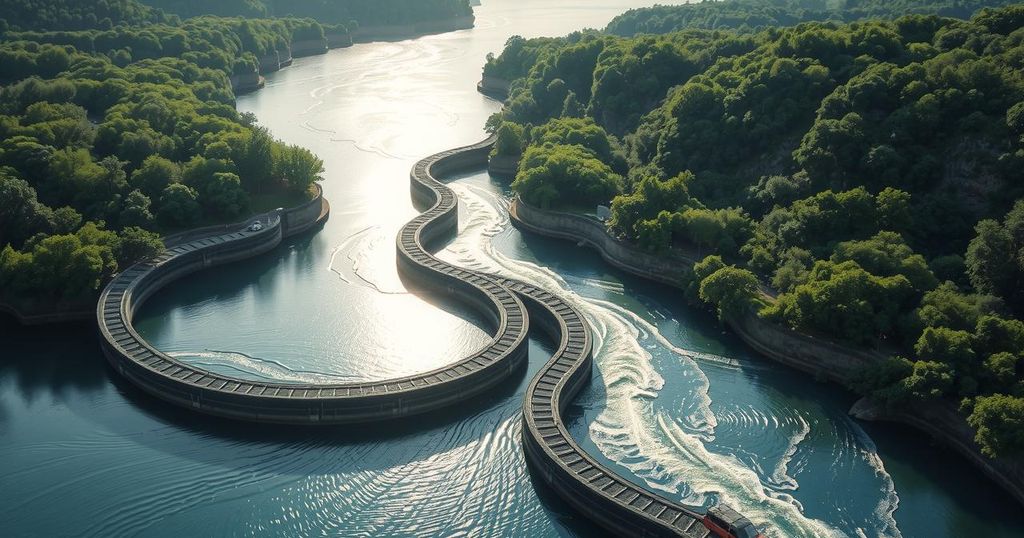Egypt is alarmed by a recent water cooperation agreement between Ethiopia and Israel, heightening concerns regarding the Grand Ethiopian Renaissance Dam’s impact on its water security. The dam threatens Egypt’s vital water resources, exacerbating existing tensions with both countries. Early analyses indicate political motives behind Ethiopia’s dam project, prompting fears of regional destabilization for Egypt.
Egypt is increasingly alarmed by the strengthening of water ties between Ethiopia and Israel, following a cooperation agreement signed in Addis Ababa on February 4. This deal is viewed as a significant threat due to the historical tensions in the region, particularly concerning the Grand Ethiopian Renaissance Dam (GERD) on the Nile River. The dam is expected to reduce Egypt’s already limited water share, which is essential for its agriculture and population.
Relations between Egypt and both Ethiopia and Israel have continued to deteriorate, raising significant concerns among Egyptian officials and specialists. “Continued water cooperation between Ethiopia and Israel is reason for concern in Egypt, given the fact that water is a national security issue for Egypt,” noted international relations expert, Mohamed al-Dehi. This growing cooperation is perceived as a strategic pressure tactic against Egypt regarding regional and international matters.
The GERD represents an “existential threat” to Egypt, as articulated by President Abdel Fattah al-Sisi, who fears substantial losses in annual water supplies. The reservoir created by the dam is vast, and Egypt worries it will exacerbate its water scarcity. Despite a decade-long negotiation process involving Sudan, no resolution has been reached, leading to accusations of Ethiopia manipulating discussions to advance its construction efforts.
Ethiopia views the dam as essential for its development, particularly in generating electricity to alleviate poverty. However, Egyptian officials are concerned that the dam will drastically diminish the Nile’s water flow, which is vital for their survival. Professor Abbas Sharaqi highlighted the financial burden Egypt faces to counteract the adverse impacts of the dam’s water retention during filling.
Although Egypt receives an annual allocation of 55.5 billion cubic meters from the Nile, it struggles with a deficit of approximately 7 billion cubic meters. As a response, Egypt is heavily investing in desalination plants and modernizing its agricultural systems to conserve water. Sharaqi emphasized, “These measures contribute to mitigating the effects of the dam on Egyptians, despite their costly nature.”
Historically, Egypt and Israel have transitioned from hostility to a perky peace influenced by regional conflicts, primarily the Palestinian situation. Current tensions, exacerbated by U.S. policies, including President Trump’s plan regarding Gaza refugees, are further complicating relations. Egypt’s rejection of these policies reflects its stance against Israeli aggressions and America’s involvement.
Cairo views the burgeoning Ethiopia-Israel cooperation as a strategic threat. Observers believe Ethiopia could be leveraging Israel to undermine Egypt by controlling crucial water resources. While Egypt has maintained a policy of non-interference, there are concerns that these developments could adversely affect its national security and water supply. Critics argue the size of the GERD suggests a political rather than purely developmental agenda, aiming to exert pressure on Egypt.
The growing cooperation between Ethiopia and Israel in water and energy sectors raises alarm in Egypt, primarily due to the threat posed by the Grand Ethiopian Renaissance Dam. Egyptian officials express concerns about national security, water scarcity, and regional influence. Historical tensions and current geopolitical factors compound the worries in Cairo, indicating a precarious situation that could significantly impact Egypt’s water resources and stability.
Original Source: www.newarab.com






